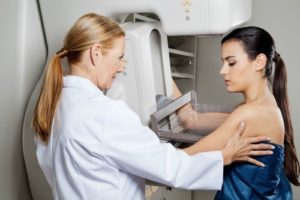
Compared to other kinds of cancers, female breast cancer is fairly common in the U.S. After skin cancer, it’s the second most common form of cancer among U.S. women. According to current rates of incidence, 12.4 percent of women born in the United States today can expect to develop breast cancer at some point during their lives. Cancer can develop in any part of the female breast – the lobules, ducts, or connective tissues. Breast cancer also occurs in males, but it does so in significantly rarer instances than in females.
According to the American Cancer Society, some of the factors that contribute to increasing a woman’s chances of developing breast cancer include:
- Age
- Genetic alterations or changes
- Mammographic breast density
- Family history of breast cancer
- Personal history of breast cancer
- Reproductive and menstrual history
- Certain breast changes found on biopsy
- Radiation therapy
- Alcohol
- Long-term use of menopausal hormone therapy
Breast cancer is detected using various approaches, such as self-examination, clinic-examination, mammograms, and biopsies. Regular exams are the most effective way to detect breast cancer in its earliest stages.
Types of Breast Cancers and Treatments
The American Cancer Society recognizes 5 types of breast cancer:
- Invasive breast cancer
- Ductal carcinoma in situ (DCIS)
- Lobular carcinoma in situ (LCIS)
- Inflammatory breast cancer
- Breast cancer during pregnancy
The stage or extent of the breast cancer is an important deciding factor in the treatment a patient receives. Stage 0 are non-invasive cancers. At Stage 1, cancers are still relatively small and have not yet spread to the lymph nodes or penetrated just a tiny part; by Stage 4, cancer has spread to other parts of the body.
Depending on the type and severity of cancer, a healthcare provider will recommend the type of treatment that will most effectively control or remove cancer. Local treatments or local therapies, such as surgery or radiation therapy, treat the tumor directly. These types of treatments are effective in treating earlier stage (less advanced) cancers.
Systemic treatments use drugs to combat cancer. They are called systemic therapies because they can reach cancer cells anywhere in the body. Systemic therapies include chemotherapy, hormone therapy, and targeted therapy.
In many instances, patients will receive more than one type of treatment for their cancer.
Errors in Diagnosing Breast Cancer
The key to beating cancer is early detection and treatment. When a general practitioner, OBGYN, pathologist, radiologist or other healthcare professional fails to provide the necessary level of care in diagnosing breast cancer, the results can be devastating for the patient. Situations in which the attending physicians fail to order the necessary tests, or the test results are misread by a radiologist or pathologist can give cancer the time it needs to spread, make it more difficult to treat and decrease the patient’s chances of survival. When these situations occur, there may indeed be grounds for a medical malpractice lawsuit in Fort Lauderdale.
Another form of potential medical malpractice involving breast cancer is a misdiagnosis based on a false negative or false positive test result. A false negative result could mean a patient may not receive the critical treatment they need. A false positive is almost as bad; a healthy patient has to deal with the emotional impact of a cancer diagnosis as well as undergo risky treatments when they aren’t necessary.
Doctors are expected to follow certain methodologies to provide their patients with an accurate and timely diagnosis. Failure to take the steps to properly and promptly diagnose breast cancer can mean delays in treatment for the patient. Getting the proper treatment promptly often means the difference between being a survivor or victim of breast cancer.
Proving Malpractice
Proving medical malpractice in a misdiagnosis for breast cancer claim in Fort Lauderdale can be a challenge. You must prove that healthcare providers failed to take the necessary steps to diagnose your cancer in a timely manner, failed to prescribe treatment in a timely manner or failed to prescribe proper treatment and that these errors were the result of the healthcare provider’s negligent behavior.
It takes an experienced Fort Lauderdale breast cancer attorney to collect the medical records and obtain the expert testimony that will be needed to establish proof of negligence in a breast cancer misdiagnosis claim. Once this evidence has been collected, the lawyer must present it to the insurance companies and a judge to show that you are owed the damages you claim.
Speak with a Fort Lauderdale Breast Cancer Misdiagnosis Attorney
If you or a family member were improperly diagnosed or treated for breast cancer as a result of the negligence of a hospital, doctor, or medical facility, contact Fort Lauderdale breast cancer misdiagnosis attorney Lisa Levine at 954-256-1820 to schedule a confidential meeting.
For more than 35 years, Lisa has been helping clients in Fort Lauderdale and other South Florida communities get the compensation they deserve for the pain, suffering and economic losses they’ve suffered as a result of negligence by medical professionals. Lisa handles breast cancer misdiagnosis and other types of medical malpractice cases on a contingency basis, which means you owe her nothing unless she wins your case.
